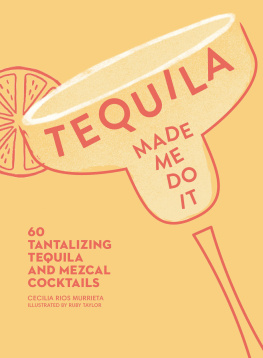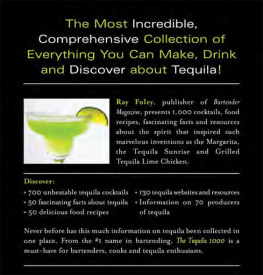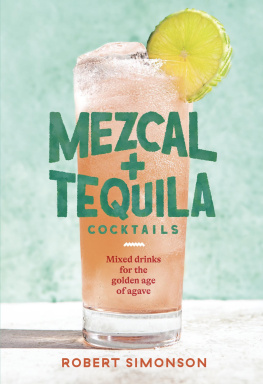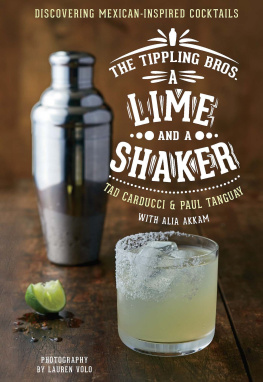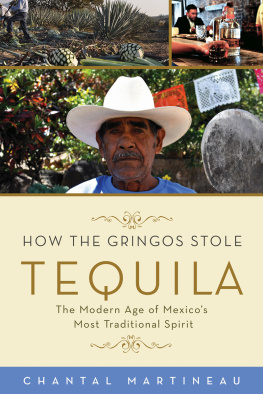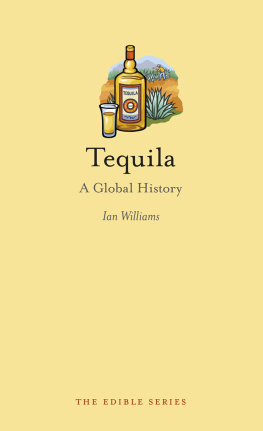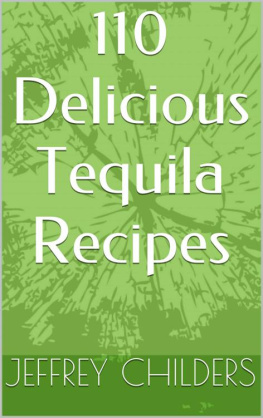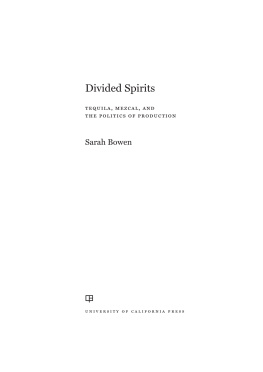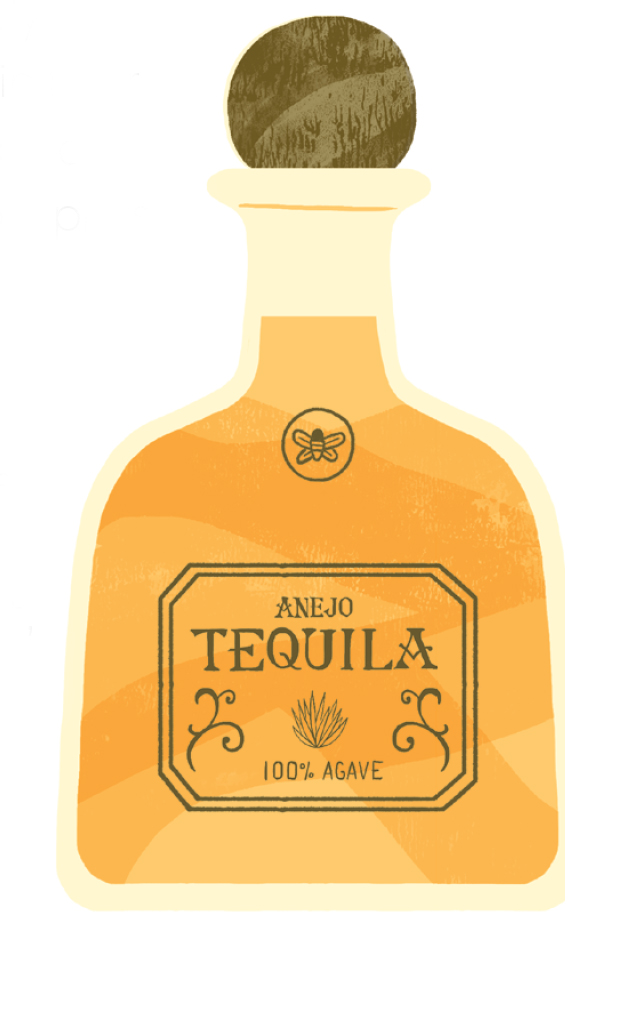Tequila Made Me Do It copyright 2019 HarperCollins Publishers . All rights reserved. No part of this book may be used or reproduced in any manner whatsoever without written permission except in the case of reprints in the context of reviews.
Andrews McMeel Publishing
a division of Andrews McMeel Universal
1130 Walnut Street, Kansas City, Missouri 64106
www.andrewsmcmeel.com
ISBN: 978-1-5248-5678-6
Library of Congress Control Number: 2019934290
ATTENTION: SCHOOLS AND BUSINESSES
Andrews McMeel books are available at quantity discounts with bulk purchase for educational, business, or sales promotional use. For information, please e-mail the Andrews McMeel Publishing Special Sales Department:
CONTENTS
INTRODUCTION
It only took one sip, and the world was smitten. Mexico, the land that not only gave us mariachis, chocolate, chilaquiles, and chapulines, also gave the world the gift of agave. Most people have heard of tequila, but mezcal and bacanora are also among the now Protected Designations of Origin that exist within the Mexican territory. With a history spanning over 400 years, agave spirits, once an obscure category within the realm of alcohol, have now become the talk of the town in a globalized world thirsty for adventure and craft.
For decades, people have associated tequila with a raucous weekend in Cabo, and mezcal with a creepy crawler at the bottom of the bottle. These associations created an unpopular image of agave spirits that did a huge disservice to the intricate process and sophistication behind the distillation of the agave plant. Today, thanks to an increased awareness of the individuality and craft behind the products we consume, the world has embarked on a journey through Mexico and its spirits. Tequila and mezcal have fought an arduous battle to gain the recognition they now have from some of the top bartenders and drinks experts around the world. These spirits take us back to the traditional roots and folklore of Mexican culture. Beyond simply becoming a trend, they have managed to maintain their traditional character and to establish themselves as a distinct and respected category within the world of spirits.
From the Margarita in one hand and this book in the other, take a sip, sit back, and enjoy the ride.
A Brief History of Agave
The legend of MaYahuel
Mayahuel was the goddess of maguey , the agave plant family,within the Nahuatl creation story. Legend says that she was one of the tzitzimime , or spirits, that lived as stars in the sky, alongside her grandmother Tzitzimitl (Celestial Demon of Darkness that blocks the sun from shining). It was said that when Earth was created and the gods gave men all the crops and sustenance they needed, they realized that it was simply not enough. Something was missing that would create joy in their hearts and spark their passions.
It was then that Quetzalcoatl (God of the Wind and Feathered Serpent) searched the heavens for Mayahuel, to return her to Earth to find a solution for making men happy. After escaping from her guardian grandmother, the goddess Mayahuel and Quetzalcoatl fell in love on their way back to Earth. When her grandmother realized that Mayahuel was gone, she and the other tzitzimime chased Mayahuel. As soonas they reached Earth, the couple attempted to hide, transforming themselves into a tree with two single branches. The tzitzimime destroyed the branch of Mayahuel, shredding her to pieces and leaving the branch of Quetzalcoatl intact. The inconsolable god picked up the pieces of his beloved and buried them in a nearby field. From her remains, a beautiful plant with large, pointed leaves eventually emerged. This is the maguey , from which, when its trunk is scraped, a sweet liquid flows. When fermented, that liquid becomes octli, or pulque.
That was how, tragically, the mission was accomplished. The two gods managed to awaken the joy in men, but at great personal cost. Represented as a young woman with multiple breasts from which the aguamiel, or honey water, flows, Mayahuel feeds the Centzon Totochtin, or 400 Rabbits, gods of drunkenness and pulque. The cult to Mayahuel has come to be associated with fertility, Earth, and the plant world.
a noBle PlanT
Agave (n.) From Greek agauos noble, illustrious
It is no coincidence that the taxonomical name for this genus of plants stems from the Greek word for nobility. In Mexico, referred to locally as maguey , agave plants are scattered throughout the landscape, from the northwestern state of Sonora all the way down to the southeastern Yucatan Peninsula. Food, drink, medicine, fuel, fibers, fertilizer, and the construction of homes are just some of the things this plant was used for by the early settlers of Mesoamerica, and the use of agave in cooking and fibers persists in Mexico to this day.
As a key part of the survival and establishment of these tribes, Mexico became the center for domestication and diversification of agave plants. Varietals were selected for their fibers, their aguamiel (honey water), or for the high sugar content provided after the hearts were cooked. As a result, agaves have their highest concentration of varietals in Mexico. Of the more than 200 species of agaves known to exist in the Americas, more than 150 of them are found in Mexico, and 129or 69 percentare exclusive to Mexico. This makes them one of the most conspicuous symbols of the Mexican territory. Found mostly in arid and semi-arid regions of Mexico, agaves can be seen in more than 75 percent of the countrys landscape and have the capacity to adapt to the most unfavorable conditions, including long periods of drought and high temperatures.
One of the most remarkable aspects of agaves is their age. The larger species can reach their maturity between 10 and 25 years, while smaller species can grow up to four and five years. This often overlooked characteristic of agaves is what makes tequila and mezcal production so unique and rare. While other neutral spirits acquire flavor and character from being aged for years in wooden barrels, agave spirits acquire these characteristics from years of the plants remaining in the fields, absorbing properties from the soil and energy from the moon and sun, giving rise to the term reposado en campo , or aged in fields.
fRoM MeXico wiTh loVe
Protected designations of origin
A designation of origin is used to recognize products that have originated from a specific region, whose quality and characteristics are derived from the environment in which they were developed. Mexico proudly boasts 14 protected designations of origin, which include spirits such as tequila, mezcal, bacanora, sotol, and charanda.
These designations preserve the tradition and production processes that make each product unique, and they also protect the integrity and quality by making it impossible to be replicated outside of their designated regions. Protected designations of origin exist all over the world. In Mexico, they are governed by the Law of Industrial Property, but some of the PDOs are also recognized and protected worldwide by the Lisbon Agreement, of which Mexico has been a member since 1958. The first Mexican PDO recognized by the Lisbon Agreement, and one of the most emblematic, was tequila in the year 1974.

